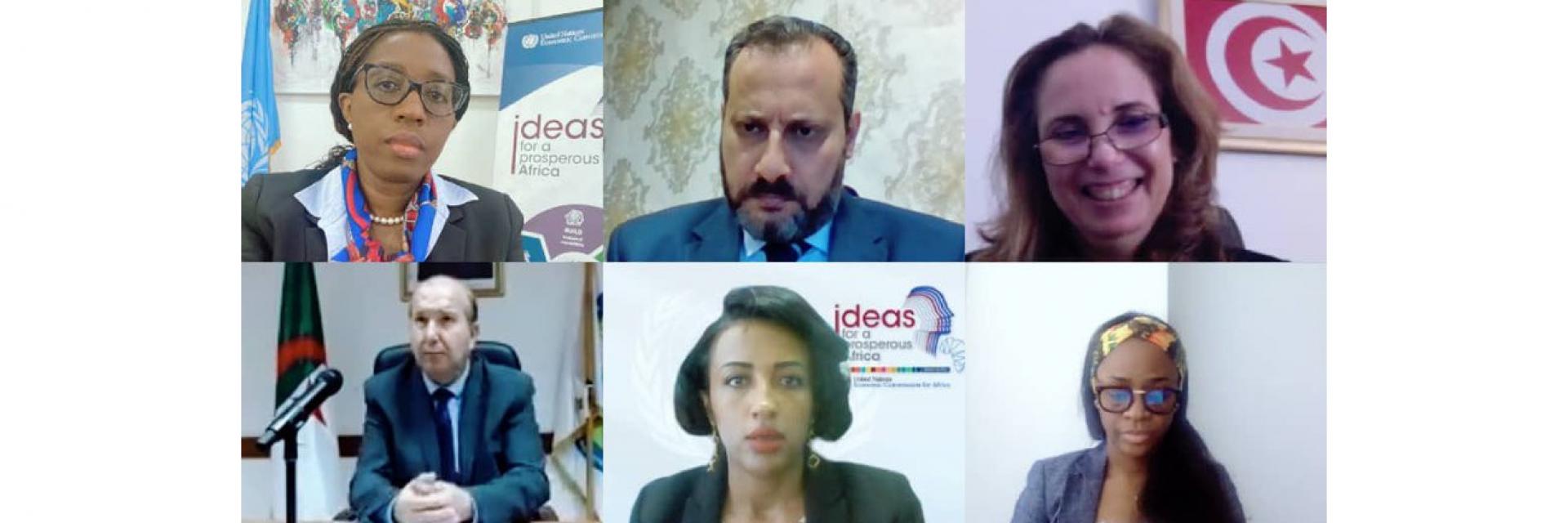Addis Ababa, 17 November 2021 - The United Nations Under-Secretary General and Executive Secretary of the Economic Commission for Africa (ECA) Ms. Vera Songwe opened the fourth biennial session of the Committee on Social Policy, Poverty and Gender today with a strong call for coordinated action on building a resilient Africa in the wake of the COVID-19 pandemic.
The two-day session brings together representatives of 28 member countries from across Africa, whose guidance will inform ECA’s work on supporting member States with tackling poverty and vulnerability while promoting gender equality and sustainable urbanization for the next two years.
In light of the ongoing global health emergency, the theme of the session is ‘building forward better towards an inclusive and resilient future in the context of COVID-19’. The committee’s participants will explore strategies that can shift the post-pandemic recovery of Africa onto an inclusive and resilient path, while determining how those can be prioritized in the policy mandates of ECA.
In her welcome remarks, Ms. Vera Songwe said: “COVID-19 is not only a severe health emergency but equally a grave economic and social crisis. The pandemic pushed an additional 55 million into poverty thereby reversing the gains made towards the 2030 Agenda for Sustainable Development. But with its challenges, COVID-19 has offered unprecedented opportunities to build back better for a future more resilient to shocks, including those related to climate change.”
Drawing on those opportunities, Executive Secretary Vera Songwe shared three reflections with the committee’s participants to steer their discussions over the next two days.
‘When Africa works together’
First, the pandemic has demonstrated that “when Africa works together, it does better”. She referred to the creation of the African Medical Supply Platform - supported by the African Union, Afriexim Bank and ECA – as an example of such coordinated response, which resulted in a 30 to 50 per cent drop in international prices of COVID-19 related products and a pooled provision of 400 million vaccinations in Africa.
Second, the African Continental Free Trade Area offers enormous potential to boost manufacturing and trade for economic growth to not only tackle poverty and inequality but also expand the pharmaceutical production and distribution capacity in the region. In the health sector alone, Ms. Vera Songwe said, the local production of pharmaceutical products is estimated to generate 16 million jobs.
Finally, the pandemic has underscored the extreme fiscal vulnerability of African economies which has worsened the pandemic’s impacts in the region. It is more urgent than ever, she insisted, to collectively address this issue across the continent.
She mentioned ECA’s Liquidity and Sustainability Facility, a new short-term lending market, which will lower the borrowing costs for governments by increasing the demand for their sovereign bonds. The facility is expected to have a proportion of the $650 billion of special drawing rights created by the International Monetary Fund to help low and middle-income countries weather the pandemic.
Towards the close, Executive Secretary Songwe said productive jobs are critical to lifting the 431 million people out of extreme poverty and protecting those at risk of falling into poverty. She urged the committee’s participants to share their valuable insights on how ECA’s work can be more tuned to the emerging needs of Africa.
‘A lot at stake’
Speaking at the session, Ms. Najla Allani, the committee’s incoming chairperson and Managing Director of Crédif, Ministry of Family, Women, Children and the Elderly, Tunisia, said: “We are in a testing period in recent human history. The development gains are at risk of being reversed considerably in light of the pandemic.”
She continued: “So, I encourage all representatives to ensure that the deliberations and outcomes of the session clearly highlight Africa’s key policy priorities, and ECA’s support role, in building an inclusive and resilient future, especially in measurably tackling poverty and vulnerability, gender inequality, youth unemployment and unplanned urbanization, among others.”
During the session, ECA will report on the work carried out in the last two years on poverty, gender and social policy, as well as present its proposed work plan for 2022-2023. Participants will advise how the proposed work plan responds to the interests of African member States and regional economic communities.
New proposals to be discussed
The committee will consider new proposals on mitigating the effects of the pandemic and building the region’s resilience against future crises. Specific proposals cover areas such as equipping women with the skills of tomorrow, creating inclusive jobs for young people and promoting resilient urban planning.
In addition, an election of the bureau was held during the session to replace the committee’s outgoing participants. Accordingly, Tunisia was elected as Chair, Somalia and Malawi as Vice Chairs, and Malawi and Equatorial Guinea as Rapporteurs. The elected members will serve the intergovernmental body for the next two years.
Ms. Najla Allani commended the outgoing participants for their “expert stewardship and valuable contributions” in ensuring the work of ECA is accurately in line with African priorities, context and existing policy frameworks.
The participants include officials from ministries of gender, youth, finance, urbanization and social policy, as well as observances from UN agencies, African intergovernmental bodies and civil society – ensuring a multi-sectoral approach to the work delivered by ECA.
Interventions from the session will result in adopted recommendations that will inform ECA’s mandates and work over the next two years.
**** ENDS ****
Issued by:
Communications Section
Economic Commission for Africa
PO Box 3001
Addis Ababa
Ethiopia
Tel: +251 11 551 5826
E-mail: eca-info@un.org

